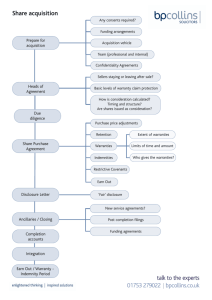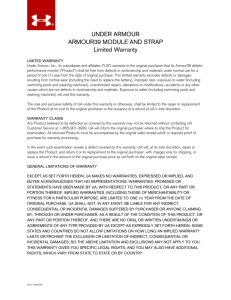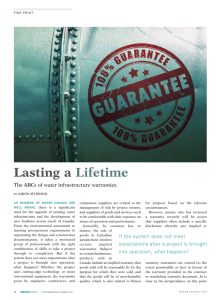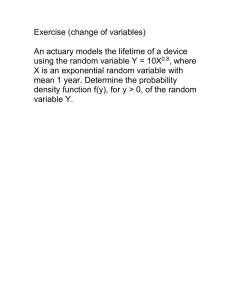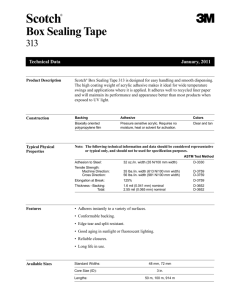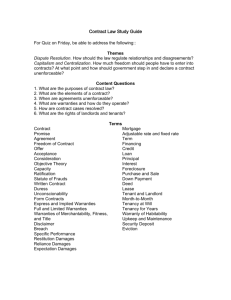Warranties
advertisement
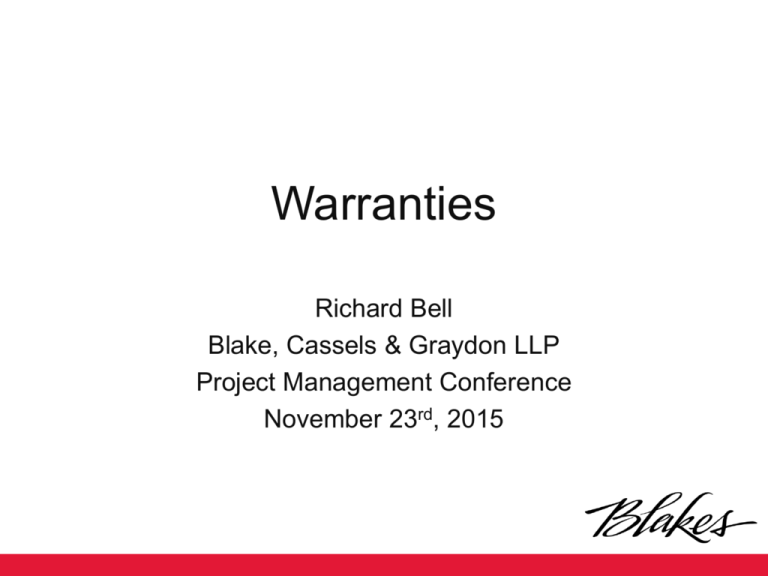
Warranties Richard Bell Blake, Cassels & Graydon LLP Project Management Conference November 23rd, 2015 Overview • Introduction to Warranties – Legal concept – Purpose • Express Warranties – Case studies – Drafting considerations • Implied Warranties – Case Studies – How to manage the risk of implied warranties Warranty as a Legal Concept • A warranty is a term in the contract which does not go to the root of the agreement between the parties, but expresses some lesser obligation • Condition versus warranty – Breach of condition = party can repudiate the contract – Breach of warranty = party gets right to damages, but not the right to repudiate – Intent of parties? Purpose of Warranties in Contracts • To allocate risk by providing a guarantee of the work done by the contractor • To provide owner with recourse against other parties, with whom they may not be in direct contractual relationship (“flow-through” warranties) • To hold a party liable for defects in work during a certain period of time notwithstanding absence of negligence Warranties in Construction Contracts • Express Warranties – Common example: time-limited express warranties – General considerations • Implied Warranties – Implied by law – Implied by fact Time-Limited Express Warranties • Time-limited express warranties are guarantees by a contractor of the work performed for a specific period of time after substantial completion i.e. [The contractor agrees] “to repair defects in workmanship in the construction of the home and to repair or replace defective material…when such later defects become apparent within one year of the date of possession of the home.” Levy v Elmer Lohnes Lumbering Ltd. (2005) (NSSC) Time-Limited Express Warranties • The time-limited express warranty requires the contractor to repair defects in construction, provided notice of the defect is given within the prescribed period • Defendant contractors may attempt to use such warranties as a defence when claims are brought outside of the stated warranty period – can they do so? Time-Limited Express Warranties • Without clear and express wording to bar claims that arise outside the stated warranty period, courts have not interpreted these warranties as excluding later actions in contract or tort – Vanir Construction Services v Field Aviation Co. (1998) (ABQB) • These warranties are seen as agreements that hold the contractor strictly liable to fulfill the promise of the written warranty within the time period specified – Strict liability means the owner doesn’t have to prove fault or negligence on behalf of the contractor in order to enforce the warranty • Time-limited warranties create additional rights in the owner, rather than limit them Case Example #1 Levy v Elmer Lohnes Lumbering Ltd, 2004 (NSSC) • Contractor hired to build a two-story home • Defects in the work arose in the first year following completion (1996), but were only discovered by warranty inspector in 2001 – owner sues for breach of warranty • Time-limited express warranty stated: [The contractor agrees] “to repair defects in workmanship in the construction of the home and to repair or replace defective material when such defects become apparent within one year of the date of possession” • Held: this time-limited express warranty did not preclude the owner from recovering damages discovered outside of the stated warranty period • Defendant contractor was held liable for defects that occurred beyond the warranty period expressed in the time-limited express warranty • The remedies available under a time-limited express warranty are in addition to and not in substitution for the owner’s common law right to damages for breach of contract • If damages/defects occur within the warranty period, the owner may either: – pursue an action for breach of contract and sue for damages; or, – enforce the warranty clause and have the contractor complete the repairs or replacement warranted for Case Example #2 Vanir Construction Services v Field Aviation Co, 1988 (ABQB) [Vanir] - Contract for design and construction of an aircraft hangar - Time-limited express warranty in place, 1 year - Cause of action for breach of warranty against contractor is discovered 6 years later (latent defect) - Time-limited express warranty clause did not protect contractor from being held liable for damages Vanir • The discoverability principle has not been applied invariably since Vanir – however, this is still an important consideration in drafting warranty clauses • The warranty clause must be very specific and clear if it is to bar further claims for damages for defects discovered after expiration of the one year period “…in absence of very clear and specific language, in the contract warranty clause, absolving liability for latent defects not discovered within the warranty period, the warranty clause limitation period will not apply to such defects when discovered” Express Warranties: General Considerations • Courts aim to uphold the freedom to contract • In absence of unconscionable conduct or inequality of bargaining power, court will enforce contracts as they are written • Parties should be aware of what risks they are taking on as a result of express warranty provisions Case Example #3 Greater Vancouver Water District v North American Pipe & Steel Ltd, 2012 (BCCA) • Contract to supply water pipes • North America Pipe & Steel Ltd (“NA”) warranted: – pipes would be “fit for the purpose for which they are to be used” – pipes would be “free from all defects arising at any time from faulty design in any part of the Goods” • Pipes suffered serious problems, caused by design drafted by Greater Vancouver Water District (“GVWD”) • GVWD sued for damages, NA counterclaimed for cost of the pipe • NA held liable for issues caused by design • Distribution of risk was agreed to by the parties, the court declined to interfere with it • When contracting over the provision of construction services or supplies, parties must seriously consider the nature of the warranties they are willing to be held to • If there is a risk a contractor should not reasonably be held responsible for, ensure it is not covered in the contractor’s warranty Some Considerations Contractor’s Perspective • Typical warranty includes a contractual promise to remedy defective work or equipment for a specified period (usually 1 to 2 years); need to consider both duration and scope of warranty • When does warranty clock start ticking? Substantial completion (when project put to use) preferable to final completion • Some contracts include an evergreen warranty (warranty period re-starts for element of work that has been fixed); should be an ultimate cut-off Contractor/Subcontractor Warranties • Contractor should watch for differences between supplier and contractor warranties (duration/scope) – When does the supplier warranty start (sale or installation vs substantial or final completion) – What exclusions are in the supplier warranty? Is the contractor warranty more general (“any defect”)? – What is the process for repairing or replacing defects under the supplier’s warranty (return of equipment for repair vs repair at site)? • Best practice: (1) incorporate warranty from general contract into subcontracts; or (2) have warranty issued to the contractor for the benefit of the owner Flow Through Warranties: Examples (1) “The warranty provisions of the Prime/General Contractors’ contract are hereby incorporated into this subcontract” (2) “For Goods procured or provided, but not manufactured by the Contractor, the Contractor will obtain and assign the original equipment manufacturer’s warranty to the Owner, unless the Contractor assembles those items pursuant to this Contract, in which case the Contractor will provide a direct warranty on all Goods. Express Warranties: Final Considerations • Clearly and expressly define duration and scope of warranty – When does the clock start? – Don’t warrant anything not within your control (passthrough warranty) • supplies; design • Avoid ambiguity – contra proferentem – Will replace things requiring “excessive servicing” – Will repair “imperfect work” • Be aware of limits place on liability found elsewhere in contract Implied Warranties • Implied by law – For policy reasons • Implied by fact – To give effect to the intentions of the parties Warranties Implied by Law • i.e. Sale of Goods Act – Implied warranty of fitness or merchantable quality Case Example #1 Fenn v Windsor Builders Supply Ltd, 1992 (Ont CJ) - Defendant manufactured and sold bricks - Plaintiffs chose bricks based on Defendant’s recommendation - Plaintiffs hired expert who said bricks need to be replaced, Defendant liable - Must be “reasonably fit for the purpose for which they were purchased” Sale of Goods Act, NWT 18(1) Quality or fitness of goods Subject to this Act or any other Act in that behalf, there is no implied warranty or condition as to the quality or fitness for any particular purpose of goods supplied under a contract of sale, except as follows: (a) where – – (i) the buyer expressly or by implication makes known to the seller the particular purpose for which the goods are required so as to show that the buyer relies on the skill or judgment of the seller, and (ii) the goods are of a description that it is in the course of the business of the seller to supply, whether or not the seller is the manufacturer, there is an implied condition that the goods will be reasonably fit for the purpose; (b) where goods are bought by description from a seller who deals in goods of that description, whether or not the seller is the manufacturer, there is an implied condition that the goods will be of merchantable quality; (c) an implied warranty or condition as to quality or fitness for a particular purpose may be added by the usage of trade; (d) an express warranty or condition does not negative a warranty or condition implied by this Act unless the express warranty or condition is inconsistent with the implied warranty or condition. 18(2) Exception Notwithstanding paragraph (1)(b), if the buyer has examined the goods there is no implied condition as regards defects that the examination ought to have revealed. Warranties Implied by Fact • 18(1)(c): based on custom or usage; where implied term is necessary to give business efficacy to a contract • Implied Warranties in Construction Contracts: – Contractor: • Work will be of “a reasonable workmanlike manner” • When done, work will be fit for the intended purpose • Work will comply with applicable codes and building regulations – Owner: will not interfere with the progress of work Owner: will not interfere with the progress of work Ellis-Don Ltd v Toronto Parking Authority, 1978 (ONSC) • Contractor hired to build parking lot • Owner failed to get excavation permit required for work to commence • Contractor sued Owner for extra cost incurred due to delay Take Away: Owner is under an obligation to take steps required for work to be done, and will risk liability for breach of an implied warranty if they fail to do so Contractor: work done in a “reasonable, workmanlike manner” Maisonneuve v Burley, 2001 (SKQB) - Plaintiff’s cabin built on a hill, hill eroding - Plaintiff hired Defendant to stop erosion by building retaining wall - Defendant was not a professional engineer - Eventually, the wall failed - Court finds Defendant breached implied warranty that completed work would be “of reasonable workmanlike quality” - Defendant held liable for $23,500 (plus the cost of hiring a qualified engineer to assess the damage) Contractor: work “fit for purpose” Probe v Comfort Mechanical Ltd, 1998 (QB) - Contract to supply and install new heating plant and to connect the newly installed plant to an existing heat distribution system - The completed heating system proved inadequate for the building - Defendant (heating contractor) failed to check compatibility of the new plant and existing system - Breach of implied warranty of fitness for purpose - Damages awarded to Plaintiff Contractor: work complies with building codes/regulations G. Ford Homes Ltd v Draft Masonry (York) co, 1983 CarswellOnt 732 (CA) - - - Contract to build stairs, Appellant was builder – Respondent supplied and installed the stairs Stairs did not meet requirements of Ontario Building Code (“Code”) Respondent sued for cost of supply and installation of new stairs Respondent was an “expert” in manufacture and installation of stairs, meaning it was reasonable for the Appellant to rely on Respondent to install staircases in compliance with the Code Court implies term that completed work would comply with the Code Respondent’s claim dismissed Manage Risk: Implied Warranties • Court will exercise caution in implying terms • Court will not rewrite parties’ contracts • Terms will be implied based on the presumed intention of the parties • Implied terms can be overridden by express terms to the contrary – Requires clear and direct language • “Provisions of this paragraph represent the only warranty . . . and no other warranty or conditions, statutory or otherwise shall be implied” More Examples “Contractor makes no other warranties with respect to the [work or supplies] other than those stated in this agreement…express or implied, or arising by operation of the law or course of performance, custom, usage in the trade or profession, including without limitation the implied warranties of merchantability and fitness for a particular purpose” “Except as expressly provided for herein, there are no representations, terms, conditions or warranties, either express or implied, made by the Contractor with respect to the use, operations, replacement or repair of the equipment and materials sold by Contractor, and all terms, conditions and warranties implied by statute, common law, equity or otherwise are hereby expressly excluded.” “Entire Agreement” Clauses • Example: The Contract, and all exhibits attached to this Contract, shall constitute the complete and entire agreement between the parties with respect to the subject matter of this Agreement. No prior or contemporaneous statement or agreement, oral or written, with respect to the subject matter hereof, shall vary or modify the written terms hereof. The Contract and its Exhibits may be amended only by a written document signed by both parties. • Be aware – unless implied warranties and implied conditions are expressly excluded, courts may still imply them • Two established principles in the law of contract: – Contra Proferentem – Clear and unambiguous language is required to exclude implied warranties (by law or by fact) and implied conditions Caution: Implied Conditions • Conditions – term of a contract that, if breached, entitles the injured party to treat the contract as repudiated • Conditions will be implied where the occurrence of an event has deprived a party of substantially the whole benefit the party was entitled to under the contract • Clauses expressly excluding implied warranties will not be effective in excluding implied conditions – must also be expressly stated Conclusion • Use warranties to allocate risk to the party best able to manage it – Who is responsible under the contract for it – Who has the financial means/insurance to cover that risk • Be clear in what you are warranting (scope, duration) – Contractor who builds shouldn’t warrant sound design • Be aware of flow-through warranties • Expressly exclude any warranties or conditions you do not want implied into the contract Questions? Richard Bell, Partner Blake, Cassels & Graydon LLP 855 - 2nd Street S.W. Suite 3500, Bankers Hall East Tower Calgary AB T2P 4J8 Tel: 403-260-9656 E-mail: richard.bell@blakes.com
